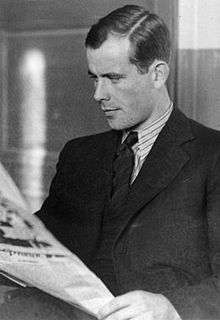Arne Skouen
Arne Skouen (18 October 1913 – 24 May 2003) was a Norwegian journalist, author, film director and film producer. [1]
Arne Skouen | |
|---|---|
 | |
| Born | 18 October 1913 Oslo, Norway |
| Died | 24 May 2003 (aged 89) Bærum, Akershus, Norway |
| Occupation | journalist, author, film director |
Biography
Arne Skouen was born in Kristiania (now Oslo), Norway. His parents were Peder Nikolai Skouen (1883-1978) and Jenny Emanuelson (1883-1975). He graduated at Hegdehaugen School in 1933. He had three distinct career careers: journalist, author and filmmaker, partly at the same time. [2]
He was a journalist at Dagbladet from 1935 to 1941. From 1941, Skouen was associated with the Norwegian Resistance Movement during the occupation of Norway by Nazi Germany. From 1943–45, Skouen worked at the press office in Stockholm, London and New York City. After the liberation of Norway at the end of World War II, he returned to Dagbladet as a columnist from 1946 to 1947 followed by Verdens Gang from 1947 to 1957. He later returned to Dagbladet, where he worked from 1971 to 1995. [2]
He debuted as an author with the youth novel Gymnasiast (1932), followed by the novel Ruth sett meg (1937). Then he published the children's play Barn av solen (1941) and Tre små enaktere (1943). This was followed by his novels Fest i Port des Galets and Romanen Gategutter (1948). He also published his autobiography En journalists erindringer (1996).[2]
He received internationally famed for his 1957 film Ni Liv, which received an Academy Award nomination for Best Foreign Language Film.[3] His first film was released in 1949, titled Gategutter (Street Boys). His 1959 film The Master and His Servants was entered into the 9th Berlin International Film Festival.[4] His 1962 film Cold Tracks was entered into the 3rd Moscow International Film Festival.[5]
In 1980, he received the Narvesen Prize (Narvesenprisen), in 1983 the Oslo City Culture Prize, in 1986 the Ibsen Prize (Ibsenprisen) and the Honorary Prize of the Amanda Prize (Amandaprisen), in 1988 the Arts Council Norway Honorary Award (Norsk kulturråds ærespris), in 1993 the Oslo Byes Veles Prize and Fritt Ord Award. He was an honorary member of the Norwegian Dramatic Society and Norwegian Film Association. [6] [7] [8] [9] [10]
Personal life
He was married in 1946 with Kari Øksnevad (born 1926). They were the parents of composer Synne Skouen (born 1950). He died during 2003 and was buried at Vestre gravlund in Oslo.[2] [11]
Selected filmography
- Emergency Landing (1952)
- Circus Fandango (1954)
- Det brenner i natt! (1955)
- Ni Liv (1957)
- Pastor Jarman kommer hjem (1958)
- The Master and His Servants (1959)
- Cold Tracks (1962)
- An-Magritt (1969)
References
- Erik Bjerck Hagen. "Arne Skouen". Store norske leksikon. Retrieved June 1, 2018.
- Gudleiv Forr. "Arne Skouen". Norsk biografisk leksikon. Retrieved June 1, 2018.
- "The 30th Academy Awards (1958) Nominees and Winners". oscars.org. Retrieved 2011-10-25.
- "IMDB.com: Awards for The Master and His Servants". imdb.com. Retrieved 2010-01-07.
- "3rd Moscow International Film Festival (1963)". MIFF. Archived from the original on 2013-01-16. Retrieved 2012-12-01.
- Kristin Skare Orgeret. "Narvesenprisen". Store norske leksikon. Retrieved June 1, 2018.
- Vidar Iversen. "Ibsenprisen". Store norske leksikon. Retrieved June 1, 2018.
- Vidar Iversen. "Amandaprisen". Store norske leksikon. Retrieved June 1, 2018.
- "Norsk kulturråds ærespris". Store norske leksikon. Retrieved June 1, 2018.
- Jon Gunnar Arntzen. "Fritt Ord". Store norske leksikon. Retrieved June 1, 2018.
- Håkon Heggstad. "Synne Skouen". Norsk biografisk leksikon. Retrieved June 1, 2018.
Sources
- Linn Ullmann (2001) Profession, director : Arne Skouen and his films (translation by Tiina Nunnally. Norwegian Film Institute) ISBN 9788280250032
External links
- Arne Skouen on IMDb
| Awards | ||
|---|---|---|
| Preceded by Rolf M. Aagaard |
Recipient of the Narvesen Prize 1980 |
Succeeded by Erling Borgen and John Olav Egeland |
| Preceded by Nils Johan Rud |
Recipient of the Norsk kulturråds ærespris 1988 |
Succeeded by Espen Skjønberg |
| Preceded by Hanne Sophie Greve |
Recipient of the Fritt Ord Award 1996 |
Succeeded by Kåre Willoch |